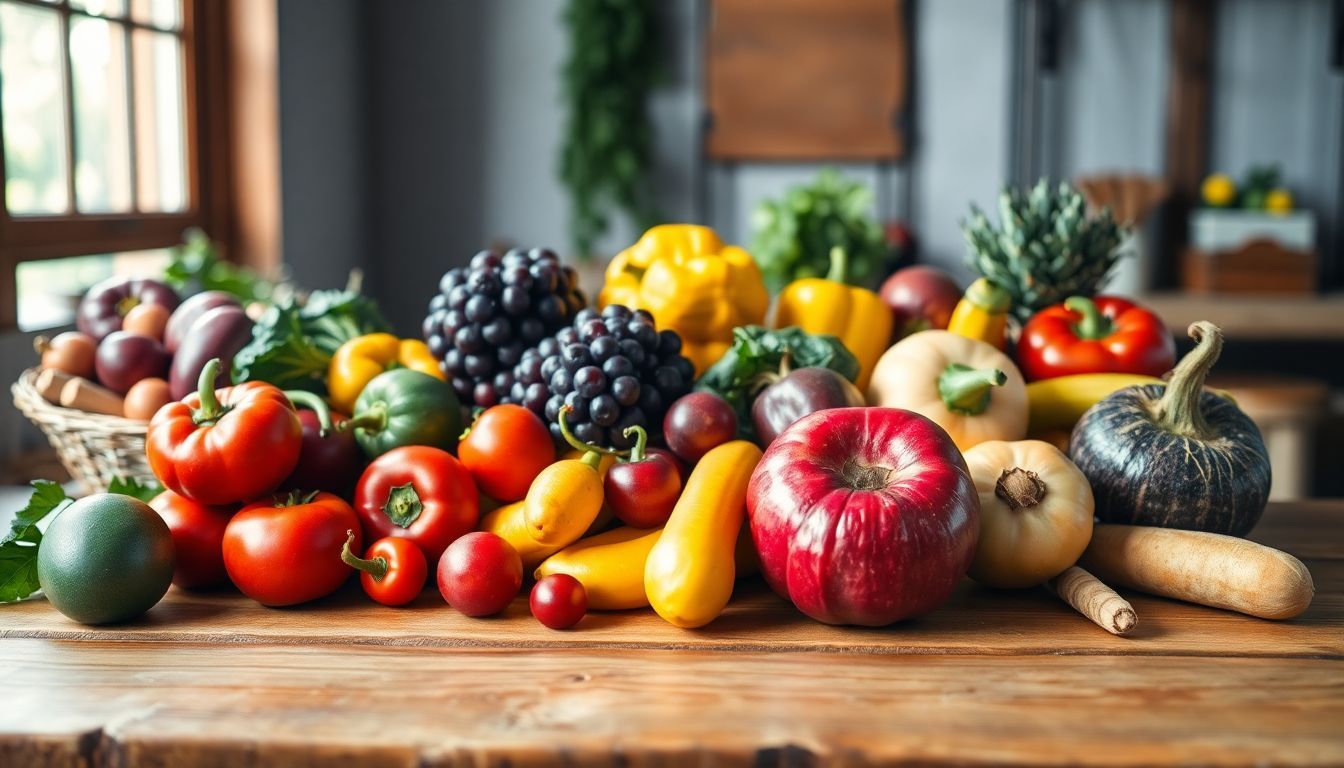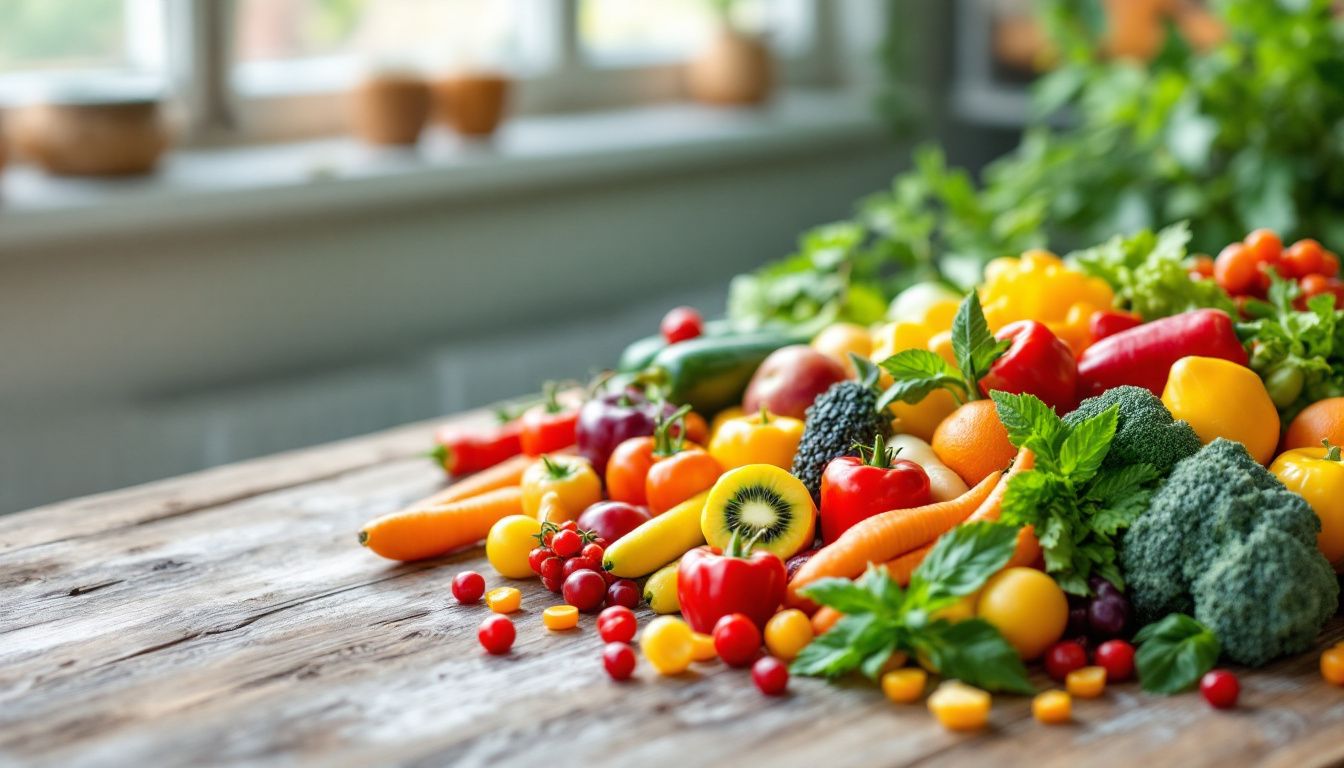Struggling with blurry vision or tired eyes? What you eat can make a big difference in your eye health. Certain foods, packed with vitamins and nutrients, help protect your eyes and improve how they work.
Thank you for reading this post, don't forget to subscribe!Keep reading to discover easy ways to boost your vision through simple diet changes!
Key Takeaways
- Certain nutrients like vitamins A, C, E, omega-3 fatty acids (DHA/EPA), lutein, and zeaxanthin protect eyes and improve vision.
- Foods like leafy greens (spinach, kale), fish (salmon, tuna), nuts (almonds), seeds (sunflower seeds), carrots, and sweet potatoes support healthy eyes.
- Omega-3s help keep the retina healthy and fight dry eye by boosting tear production; DHA makes up 93% of retinal fat.
- Lutein and zeaxanthin shield against blue light damage and lower the risk of macular degeneration or cataracts. Aim for 10 mg lutein and 2 mg zeaxanthin daily.
- Planning meals with colorful veggies, fruits, whole grains, nuts/seeds helps prevent age-related eye problems like AMD or cataracts over time.
Key Nutrients for Eye Health
Your eyes need the right nutrients to stay healthy and strong. These include vitamins, antioxidants, and healthy fats that support vision and protect against damage.
Vitamins A, C, and E
Vitamin A helps with night vision and keeps your eyes moist. It supports retinal pigments, which improve low-light vision. You can find it in carrots, egg yolks, spinach, dairy, and liver.
Eating these foods protects against dry eye problems too.
Vitamin C fights free radicals that damage your eyes over time. It also lowers the risk of age-related cataracts. Foods like oranges, peppers, kale, and broccoli are packed with this nutrient.
Vitamin E protects fatty acids in the retina from oxidation. This helps prevent age-related macular degeneration (AMD). Enjoy almonds, sunflower seeds, or avocados for a good dose of Vitamin E…
### Next: Omega-3 Fatty Acids
Omega-3 Fatty Acids
Your eyes need omega-3 fatty acids to stay healthy. These fats, mainly EPA and DHA, support the retina. A lack of DHA can harm vision over time. Omega-3s also help with dry eye by boosting tear production.
Fatty fish like salmon and tuna are rich sources of omega-3s. They keep eyes moist and may lower the risk of age-related macular degeneration (AMD). Experts suggest a balance—keeping your omega-6 to omega-3 ratio at 4-to-1 or less—for better results.
DHA makes up 93% of the fat in your retina—showing just how vital it is for clear vision.
Lutein and Zeaxanthin
Omega-3 fatty acids boost eye moisture, but lutein and zeaxanthin protect vision in different ways. These plant nutrients act like shields for your eyes against harmful blue light.
They also fight free radicals that can damage cells.
Eating spinach, kale, and collards gives you a high dose of these carotenoids. Egg yolk and peppers are other good food sources. Experts recommend 10 mg of lutein and 2 mg of zeaxanthin each day to reduce the risk of macular degeneration (AMD) or cataracts as you age.
Many Americans eat only about 12 mg combined daily—so adding more leafy greens can help improve eye health now and later!
Top Foods for Good Vision
Eating well can keep your eyes in top shape. Certain foods are packed with nutrients that support clear and healthy vision.
Leafy Greens: Spinach, Kale
Spinach and kale pack a punch for your eyes. They are rich in lutein, zeaxanthin, vitamins C and E—essential nutrients that fight free radicals. These antioxidants lower the risk of age-related macular degeneration (AMD) and cataracts.
A cup of spinach meets 56% of daily vitamin A needs and provides all the vitamin K you need for the day.
Kale shines with its high levels of lutein and zeaxanthin. It also covers your daily dose of vitamins A, C, and K altogether. These nutrients protect eye tissues from harmful UV rays while improving overall vision.
Fish like salmon provides even more protection for your sight…

Fish: Salmon, Tuna
These fish are packed with omega-3 fatty acids. Salmon provides DHA and EPA, which support retinal health. These fats may lower the risk of glaucoma and age-related macular degeneration (AMD).
Tuna also boosts eye health with its high omega-3 content.
Omega-3s help fight dry eyes by improving tear production. Regular fish consumption can benefit vision improvement and reduce inflammation in the eyes. Aim for two servings of fatty fish each week, like tuna or salmon, to protect your sight naturally.
Nuts and Seeds: Almonds, Sunflower Seeds
Fish like salmon provide omega-3s for eye health, but nuts and seeds also play a big role. Almonds are packed with vitamin E, protecting your eyes from oxidative damage. Just one ounce provides nearly half of your daily needs.
Sunflower seeds are another great choice. They’re rich in both vitamin E and zinc which help support overall vision function. These seeds may lower risks of cataracts and slow age-related macular degeneration (AMD).
Snack on a handful or sprinkle them over salads for an easy boost. Both options fit perfectly into any diet aiming to protect the eyes!
Colorful Fruits and Vegetables: Carrots, Sweet Potatoes
Carrots and sweet potatoes pack a punch for eye health. Carrots are loaded with beta-carotene, a form of vitamin A that helps maintain strong night vision. Sweet potatoes also deliver beta-carotene, along with over half your daily vitamin C needs and small amounts of vitamin E.
These nutrients protect the eyes from damage caused by free radicals.
A diet filled with colorful fruits and vegetables like these supports overall vision improvement. Both foods help prevent dry eyes and keep the retina healthy. Their rich orange color signals their nutrient-dense makeup—making them easy choices for better sight!
Incorporating Eye-Healthy Foods into Your Diet
Adding eye-friendly foods to your meals can be simple and enjoyable. Small changes in daily choices—like swapping snacks or boosting veggies—can make a big difference for vision care.
Sample Meal Ideas
Eating eye-healthy meals can be simple and tasty. Below are some easy meal ideas packed with nutrients for better vision.
- Monday: Start the day with scrambled eggs, spinach, and red peppers on whole-grain toast. For lunch, enjoy a grilled chicken salad with carrots, mixed greens, and sunflower seeds. Have baked salmon with steamed broccoli and quinoa for dinner. Snack on carrot sticks with hummus.
- Friday: Have poached eggs, cherry tomatoes, avocado slices on whole-grain toast for breakfast. A turkey wrap filled with spinach, carrots, and red peppers makes a great lunch. Dinner can be beef chili with kidney beans served alongside cornbread. Snack on Greek yogurt sweetened with honey and topped with chia seeds.
- Saturday: Make a spinach and mushroom frittata for breakfast. Lunch could feature a bean salad using black-eyed peas, kidney beans, lime dressing, and raw red peppers. Dinner might include grilled shrimp over quinoa paired with steamed broccoli florets. Snack on baby carrots dipped in hummus.
- Sunday: Try oatmeal loaded with banana slices, almond butter spread, and chia seeds to kick off your morning routine. For lunch, go for grilled chicken Caesar salad using leafy greens like kale or spinach sprinkled with sunflower seeds on top. Dinner pairs roasted Brussels sprouts alongside baked tilapia fillets served next to crispy sweet potato wedges—snack bell peppers sliced thinly dipped into guacamole bowls!
Each meal choice helps fight harmful free radicals while promoting good night vision care!
Tips for Balanced Nutrition
Plan meals that include whole grains, colorful fruits, vegetables, and lean meat. Add sweet potatoes, spinach, or kale for key nutrients like lutein and vitamin A. These foods help protect against vision loss and macular degeneration.
Snack on almonds or sunflower seeds to get vitamin E. Include fatty fish like salmon for omega-3 fatty acids in your diet. These support eye health and help with dry eyes. Pair these with citrus fruits like oranges for a boost of vitamin C to fight free radicals harming your eyes!
Conclusion
Eating the right foods can help keep your eyes healthy. Vitamins, antioxidants, and omega-3s play a big role in protecting vision. Foods like leafy greens, fish, nuts, and colorful vegetables make a difference.
Small changes to what you eat today may support your sight for years to come. Take care of your eyes—they deserve it!
For more healthy eating tips, check out our guide on how high-quality carbohydrates can prevent middle-age weight gain.
